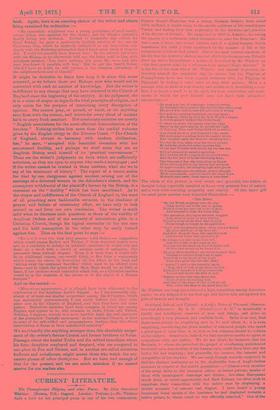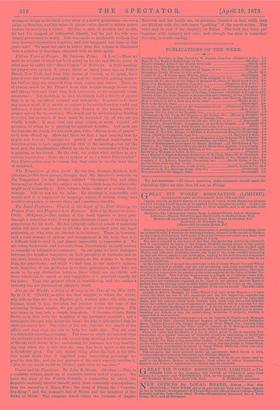Overland, Inland, and Upland: a Lady's Notes of Personal Observa-
tion and Adventure. By A. U. (Seeleys.)—" A. U." is manifestly a kindly and intelligent observer of men and things, and gives us accordingly a very pleasant and readable book. India is- so vast, that there must always be something new to be said about it ; it is even surprising, considering the groat number of educated people who spend a great part of their lives in it, that so few volumes should be written on the subject. Sometimes, indeed, we find ourselves unable to agree or sympathise with our author. We do not think, for instance, that the Brahmin, to whom she preached the gospel of everlasting punishment for ninety-nine-hundredths of the human race, could have been any the better for her teaching ; but generally, she secures tho interest and sympathies of her readers. We are sorry, though scarcely surprised, to find her distinct testimony as to the deplorable tone of Anglo-Indian manners in respect of the native population :—" Almost every member of the army, down to the youngest officer or lowest private, speaks of them with unmitigated contempt and dislike; low-class Europeans insult them at every opportunity, and East Indians too often seek to repudiate their connection with the native race by displaying a double measure "of rancour and disgust. I have heard a yotmg lieutenant boast openly of the insolence he had displayed towards, a native prince, to whose court he was officially attached." One of the strangest things in the book is the story of a native gentleman—he was a judge in Bombay, and his name is given—who dared to violate native
custom by marrying a widow. He was a man of position and wealth,
he had the support of influential friends, but he and his-wife were simply persecuted to death. Life was made so intolerable to them that
they drowned themselves together, and this happened but three or four years ago I We must not omit to notice that the -volume is illustrated with a number of drawings, executed with no little spirit.



































 Previous page
Previous page